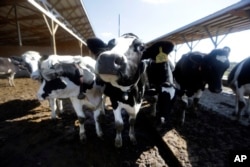Livestock producers often guard against disease and speed the growth of healthy animals by feeding their herds and flocks frequent, low doses of antibiotics. Scientists and consumers are increasingly concerned that this practice is creating superbugs that are resistant to drugs.
Lilly Adams, with the consumer advocacy group Food and Water Watch, is one of many activists working to stop what she sees as the overuse of antibiotics on factory farms.
"Eighty percent of our antibiotics in the United States actually are used on factory farms to compensate for really filthy, crowded conditions," she said. "This just isn't how antibiotics are meant to be used. So this overuse of the antibiotics is causing antibiotic-resistant bacteria to grow in the farms, and this spreads into the environment."
And that has been linked to more infections in humans that do not respond to available drugs, and an estimated 700,000 deaths a year globally.
Consumer pressure forces change
Many farmers, including Tory Hancock of Ploughshares Community Farm, already raise livestock without antibiotics.
"You give the animals a stress-free environment and a healthy diet, you know, really good feed, and you generally don't need it," she said.
And many customers willingly pay more for antibiotic-free beef, as well as bacon from antibiotic-free pigs.
In fact, consumer pressure has been a major force in bringing about that change, says Anna Zorzet, a scientist and activist who spoke at the American Association for the Advancement of Science annual meeting.
"Sweden was the first country in the world to ban the use of antibiotics as growth promoters in 1986, and the EU followed suit in 2006," she said. "The farmers felt that they couldn't justify the use of antibiotics, and the public opinion was quite a lot against it."
Europeans see improvements
Many Northern European countries now ban regular antibiotics for healthy livestock, and they also have stricter rules for human antibiotics.
It has paid off, according to Diarmaid Hughes, a Swedish professor of bacteriology.
"Consistently, the Nordic countries – Sweden, Finland, Norway, Denmark – have lower rates of resistance for all of the major infections," he said. "And you see the countries of southern and eastern Europe where regulation is much more lax, they have much, much higher rates of resistance. And in many cases it's completely out of control, so the message is that regulating usage and the total amount that you use really does have an effect."
Hughes says the entire world needs these policies. Otherwise, he warns, antibiotic-resistant pathogens will cause more deaths from currently treatable illnesses such as pneumonia, cholera and tuberculosis. In addition, he says, deaths after routine surgery for an injured knee or a heart attack may become commonplace.
"All of these will become very dangerous operations,” Hughes said, “because you have to give them effective antibiotics to have a safe operation."
Changes ahead for US farms
In the United States, consumers are pushing harder to reduce antibiotic use in livestock, according to the National Farm Foundation.
Its president, Neil Conklin, says the educational group is holding seminars to prepare farmers for stricter government rules on antibiotics, due to take effect in 2017. They will no longer be able to use antibiotics to promote growth, but only to treat infections. In addition, the drugs must be prescribed and administered by a veterinarian.
"This is going to be a big change for farmers and veterinarians and also for feed companies," Conklin said, "because many of these products are administered in feed."
Conklin says that even before the FDA rules go into effect, consumer pressure is leading many companies to cut back on antibiotics in their products. "If you look at where consumers are having the biggest effect, I think right now it's through the marketplace, it's through companies like Chick-fil-A, McDonald’s, as well as companies such as Tyson and Purdue."
Late last month, the fast-food chain Subway announced that it would phase out antibiotic use in meat in its US stores.














